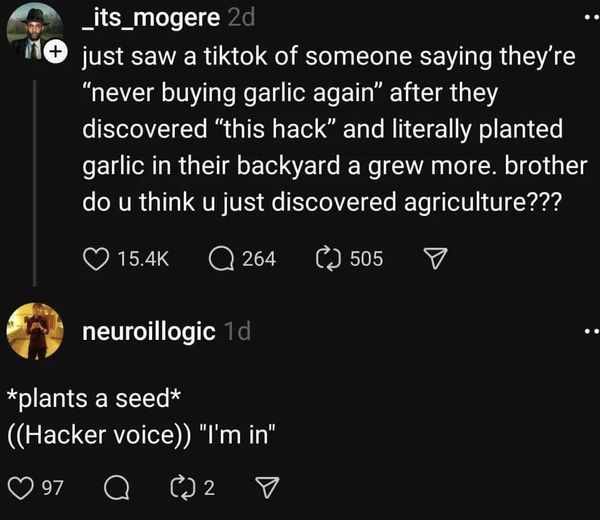this post was submitted on 13 May 2024
1742 points (99.3% liked)
Microblog Memes
5914 readers
6492 users here now
A place to share screenshots of Microblog posts, whether from Mastodon, tumblr, ~~Twitter~~ X, KBin, Threads or elsewhere.
Created as an evolution of White People Twitter and other tweet-capture subreddits.
Rules:
- Please put at least one word relevant to the post in the post title.
- Be nice.
- No advertising, brand promotion or guerilla marketing.
- Posters are encouraged to link to the toot or tweet etc in the description of posts.
Related communities:
founded 1 year ago
MODERATORS
you are viewing a single comment's thread
view the rest of the comments
view the rest of the comments

Compost is a home project (and available in some cities as part of the waste management system) and nutritious for plants; but most of the things I grow as food I don't fertilize much or any. The fruit trees once a year or so, the garden soil sometimes in between planting or when growing watermelon or squash, bigger things do need some extra fertilizer (and tomatoes like some) but most seem to do fine with good soil and crop rotation/companion planting. Farmers have to use more because they've depleted the soil with monoculture. I still don't think it's cost effective when time is factored in, but it's better fresher food and not as fussy as farming.
Genius, you just keep putting back less than you take and it lasts forever~! How come nobody thought of that? Snark put aside for a moment, I think composting on a large scale should be done, even in urban environments, but it won't impact the statement I made even a single bit.
Dunno what to tell you - different plants put different things into and out of the soil, we cut the grass in the yard, and the bushes and things, all sorts of stuff can go into the pile that becomes nutrients and of course plants eat sunshine, not just soil nutrients. It's been working a few years and the soil keeps improving.
Farming is a whole different thing and more reliant on fertilizer.